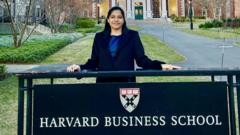Harvard University, renowned for being a top choice for international students, is now embroiled in a crisis impacting over 6,800 of its foreign enrollees due to recent policy changes implemented by the Trump administration. Among them is Shreya Mishra Reddy, who was thrilled to gain admission in 2023, but now faces uncertainty about her graduation from the executive leadership program. Her family’s excitement has turned to despair after hearing the news that international students may no longer be welcomed at Harvard due to allegations of legal noncompliance by the university.
The decision, described by Harvard as "unlawful," may lead to a significant legal battle, leaving students in a precarious situation—whether they are current enrollees, those awaiting admission, or graduates dependent on student visas for job prospects. Many must consider transferring to other institutions in the U.S. to maintain their residency. Reddy expresses hope that Harvard will fight for its international students.
With more than a third of Harvard's foreign population coming from China, the repercussions of this policy ripple through the broader international student community, estimated at one million in the U.S. The changes come amid an increasing scrutiny by the Trump administration on universities perceived to harbor political dissent. The administration previously threatened to restrict admissions after Harvard refused to modify its operations, leading to a contentious environment for foreign scholars.
Student reactions vary, with some expressing shock and concern over the uncertain future in America. Chinese student Kat Xie describes her feelings as one of disbelief as options for staying in the country become expensive and complicated. Meanwhile, Abdullah Shahid Sial, a Pakistani junior, articulates the emotional toll these developments are taking, highlighting a shift in the once-welcoming atmosphere for international students.
As fear permeates among students worried about their visa status and the potential disruption of their lives, recent tensions have raised questions about the U.S.’ stance on educational inclusivity. This situation not only affects those present at Harvard but also casts doubt on the future of incoming international students who had made life-altering decisions in favor of the Ivy League institution. Students like Jiang Fangzhou, a New Zealander, emphasize that many have built lives around their studies in the U.S., making any potential hasty departures intensely challenging. As this saga unfolds, the international student community at Harvard grapples with anxiety over their academic and professional futures.























